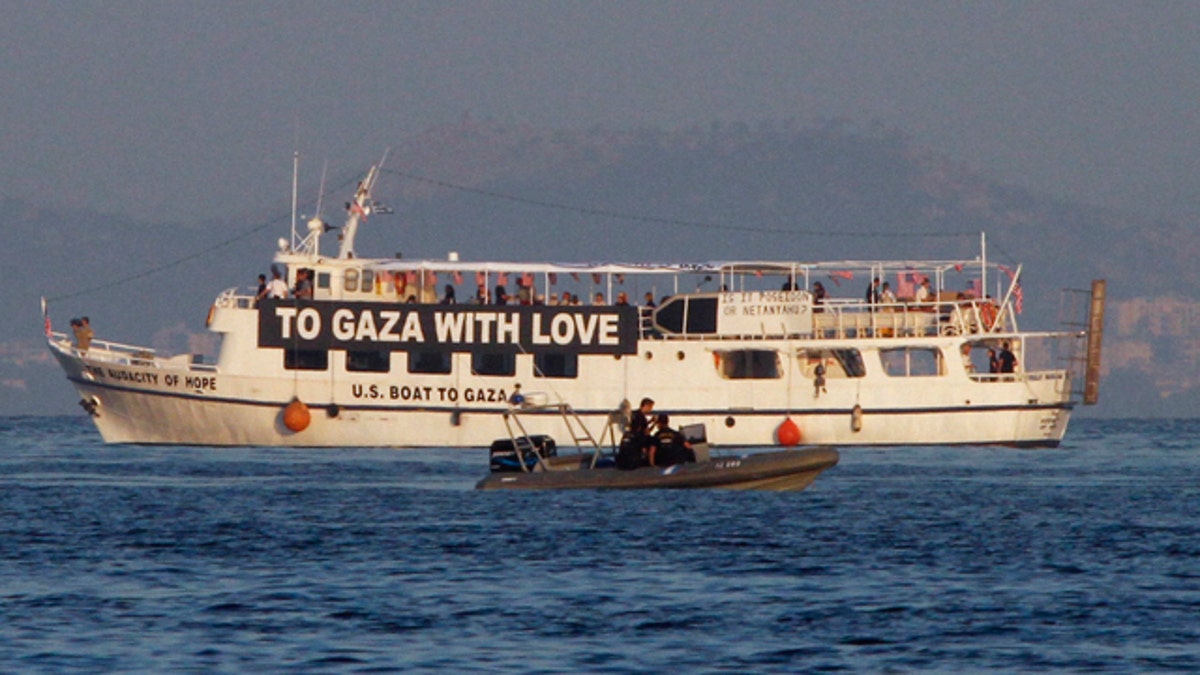
July 1: The activist run boat “Audacity of Hope” is escorted by the Greek coast guard in port of Perama, near Athens, Greece. (AP)
ATHENS, Greece – Organizers of a Gaza-bound flotilla said Sunday they have not abandoned their plans to breach Israel's sea blockade of the territory despite a Greek government ban on their vessels leaving Greek ports.
The campaign suffered a major setback when Greece announced its restrictions on Friday, and authorities arrested the captain of a boat carrying American activists that tried to leave Greece without permission.
However, organizers of the flotilla were trying to maintain momentum with planned protests in Athens in the face of increasing calls for them to scrap their campaign. On Saturday, the Middle East Quartet of Mideast mediators -- the U.S., U.N., EU and Russia -- urged governments to discourage Gaza-bound flotillas that could escalate tension in the region.
Activist Dimitris Plionis said there would be "some action" at the beginning of the week, but he did not specify what the pro-Palestinian activists were planning to do, presumably because Greek authorities might try to thwart their efforts.
"The ban is there and we have already said that we are still considering to sail," Plionis said. "This story is not finished."
Without elaborating, he noted that "ships are free to go to other locations" besides Gaza.
The comment raised the possibility that organizers have debated whether their vessels could declare they are bound for another destination, and then turn toward Gaza once they are in international waters. The flotilla has planned to carry medicine, construction equipment and other aid to the coastal strip.
Israel says it imposed the blockade in 2007 to stop weapons reaching Hamas, the Islamic militant group that rules Gaza.
Nine activists on a Turkish boat were killed last year in an Israeli raid on a similar flotilla, and Israel eased its land blockade after an international uproar over the incident. But Israel has pledged to thwart any attempt to reach Gaza by sea, and that aid deliveries can occur through its own established channels.
Activists reject that option, saying Israeli restrictions on the Palestinian territory of 1.5 million amount to a human rights violation.
In a statement, the Greek Foreign Ministry said it banned the flotilla from sailing out of concern for "the protection and safety of human life," while noting the need to lift the Gaza blockade and improve humanitarian conditions there.
"Greece reiterates its willingness and proposes to undertake the task of transporting the humanitarian aid, with Greek vessels or other appropriate means, through the existing channels" in line with a U.N. request, the ministry said.
Members of the flotilla have accused Greece of succumbing to Israeli pressure to block their plans, which had been held up by administrative delays and legal entanglements prior to the ban on sailing.
Greece, keen to boost international investment and ease its financial crisis, has maintained close relations with Arab countries, but in recent years has forged closer military and economic ties with Israel. The shift came amid a deterioration in the Jewish state's ties with Turkey, Greece's traditional regional rival and a fierce critic of the three-week Gaza offensive launched in late 2008 by the Israeli military.
Prime Minister Benjamin Netanyahu of Israel singled out Greece last week when he praised a group of foreign countries for helping to block the flotilla. In a speech, he thanked "my friend, the Greek Prime Minister George Papandreou."
